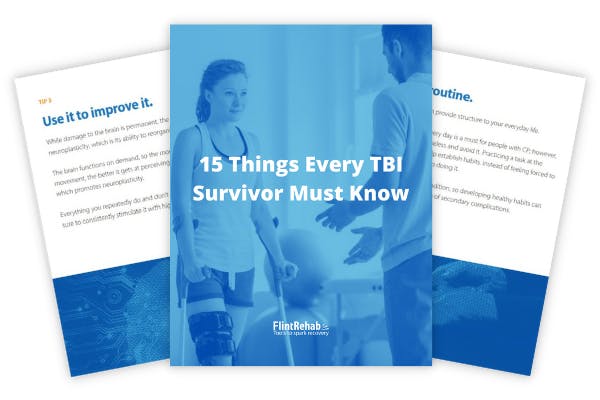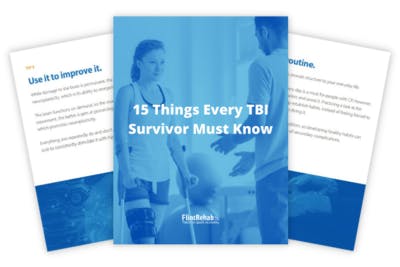No products in the cart.
No products in the cart.
No products in the cart.
No products in the cart.
Home » Neurological Recovery Blog » Traumatic Brain Injury » Aphasia After Brain Injury: Understanding Language Difficulties & The Recovery Process
Last updated on May 20, 2024

Aphasia after brain injury can occur when the areas of the brain that control language are impacted, which commonly occurs after a left hemisphere TBI. There are many types of aphasia; some affect the ability to produce language while others affect the ability to understand it.
Because there are various types of aphasia and many different symptoms survivors can experience, it’s important to work closely with a Speech-Language Pathologist (SLP) for a proper diagnosis and rehabilitation plan.
This article will guide you through the three most common types of aphasia after brain injury and how to manage them.
Aphasia after brain injury is caused by damage to the parts of the brain responsible for speech and language, which for most people are located in the left hemisphere. In some left-handed individuals, the language centers may actually reside in the right hemisphere.
Within the brain, there are two areas in particular that control most language-related functions: Broca’s area and Wernicke’s area. Wernicke’s area is primarily involved with comprehension of language, and Broca’s area with speech production. When these structures become damaged by a traumatic brain injury, the neural pathways that control language are not able to function normally.
Fortunately, through regular and consistent therapy, the skill of language and communication can be relearned and strengthened. Before your Speech-Language Pathologist sets up a therapy plan, though, it’s important to determine in detail what type of aphasia you have so that you will have a rehabilitation program tailored to your specific needs. A Speech-Language Pathologist is the perfect expert to help you with this diagnosis and recovery plan.
There are many types of aphasia after brain injury that survivors may experience based on the size and location of the brain injury. Three of the most common types of aphasia after brain injury include receptive, expressive, and anomic aphasia.
Receptive aphasia, also known as fluent or Wernicke’s aphasia, involves difficulty understanding spoken or written language. This can include the inability to read, difficulty understanding the speech of others, mixing up words, or forming jumbled sentences. Receptive aphasia can also cause individuals to say words or phrases that sound fluent but lack meaning or substance.
Expressive aphasia, also known as Broca’s aphasia, involves difficulty producing language. Survivors may know what they want to say but struggle with finding the right words to express it. Additionally, individuals with expressive aphasia may experience difficulty with verbal expression, uttering short sentences or single words repeatedly, struggling to write, improper grammar, or using conjunctions.
Another common but mild type of aphasia is called anomic aphasia, which involves difficulty retrieving words. This can include the inability to select the right words like nouns and verbs, or speech with vague words and expressions.
Survivors can experience more than one type of aphasia after brain injury, resulting in mixed symptoms. Therefore, it’s important to consult with a Speech-Language Pathologist to obtain a proper diagnosis and create a customized rehabilitation plan.
As you work with your SLP to overcome aphasia after brain injury, you will notice that practice is the essence of recovery. This is because practice helps activate neuroplasticity, which is one of the most efficient and important ways to help the brain heal and treat aphasia.
Neuroplasticity is the brain’s ability to rewire itself. When functions such as speech and language are affected by brain injury, neuroplasticity helps create new pathways and strengthen existing ones. This helps survivors restore their language skills.
One of the best ways to activate neuroplasticity is through therapy and repetition, or “massed practice.” The more frequently and consistently a skill, like language, is practiced, the more neuroplasticity is stimulated.
Here are several therapies available that can help activate neuroplasticity and improve aphasia after brain injury:
Here are several therapies available that can help activate neuroplasticity and improve aphasia after brain injury:
Cognitive rehabilitation therapy is particularly helpful for survivors with aphasia. It involves a wide range of interventions to help stimulate the brain and improve cognitive functions. During cognitive rehabilitation, your therapist will prescribe a unique combination of exercises tailored to language and cognitive skills. The important component to cognitive rehabilitation is consistently stimulating your mind with the types of activities your therapist suggests. Although, motivation at home to keep up with these activities can wane, your brain still requires the stimulus prescribe to grow. This is why finding apps like Constant Therapy help you to effectively continue rehab activities throughout your day.
A popular method to effectively continue cognitive rehabilitation at home includes the use of the CT Speech and Cognitive Therapy App. It provides access to over 100,000 scientific-based speech and cognitive exercises designed by Speech-Language Pathologists for survivors to utilize anywhere, anytime. This makes it easier for survivors to stay engaged in therapy outside their appointments, which is essential to stimulate neuroplasticity. And the more you use the app, the better it understands what exercise and challenge levels you need.
Want to learn more about the CT Speech and Cognitive Therapy App? Get Started Here.
(Link opens a pop-up for uninterrupted reading.)
Another treatment for aphasia after brain injury is Constraint Induced Aphasia Therapy (CIAT). This is an intensive therapy model based solely on the use of verbal oral language. Any other channels of communications [or alternative communication methods] like writing, gesturing, or pointing are not allowed.
While it may be challenging or frustrating not to rely on gesturing to get your thoughts across, studies have shown that CIAT is effective in improving language performance including naming, comprehension, repetition, and written language. The study also found that expanding therapy sessions to about 2-3 hours a day can help survivors make significant improvement.
When aphasia is severe and survivors cannot talk at all or have very limited speech, such as with nonfluent aphasia, SLP’s may recommend Melodic Intonation Therapy (MIT), or Singing Therapy. This type of therapy works by allowing the individual to sing their words (a right hemisphere skill) instead of speaking their words (a left hemisphere skill).
During melodic intonation therapy, the therapist taps along with the song to help engage more areas of the brain (specifically the frontal-temporal regions of the right hemisphere). This allows individuals who otherwise cannot speak the ability to sing their words.
When the brain sustains an injury to the areas that control speech and language, those skills may become impaired — but there is hope for recovery. The brain is capable of rewiring itself through neuroplasticity, which can be activated through therapies like cognitive rehabilitation and singing therapy, among others.
To determine what type of aphasia you are looking to overcome, it’s imperative to work with a Speech-Language Pathologist. They can provide a proper diagnosis and create a rehabilitation plan most suitable for you.

If you like our content, you’ll love our ebook and newsletters! Get instant access to our TBI recovery tips ebook with 20 pages of helpful advice by signing up below.
You’ll also receive our emails that share survivor stories and more useful TBI recovery tips, which you can opt out of at any time. (We know you’ll love them, too.)
We will never sell your email address, and we never spam. That we promise.


Time with a speech therapist is extremely valuable during recovery, especially if you struggle with communication, critical thinking, or memory after brain injury. Insurance typically covers speech therapy for a fixed amount of time. But once it’s over, recovery is in your hands.
That’s why a team of neuroscientists and clinicians from Boston University created the CT Speech & Cognitive Therapy app. Designed for those recovering from stroke, TBI, or living with neurological conditions, the app contains over 100,000 cognitive exercises that are all available right from your phone or tablet. That’s like having a speech therapist by your side whenever you want!
This app is the perfect fit if you want to improve your speaking, memory, or general mental sharpness. And, it’s affordable at just $29.99/month!
“For the past 6 months, my son has used the app about three times a week. The app is like a virtual therapist, it’s very easy to use, and it gives him immediate feedback.
He now understands things faster, can make decisions with less hesitation, has improved recognition of words, and his confidence is higher. I also find it easy to get in touch with customer service; they pleasantly help out. The whole experience has been great.”
— Miriam
With the CT App, you can get the guidance you need right from your phone or tablet. You can use it on your own or in between sessions with your speech therapist.
Whether you struggle with aphasia, memory loss, or critical thinking, the CT Speech & Cognitive Therapy App can help.
“The CT app has helped me gather my confidence by building on and reinforcing old forgotten skills. It helps to see my percentages increase, and work harder when they decrease. It’s very self-motivating.” -Kathryn
We are confident that this app will help improve your speech and cognitive function after brain injury. Like our recovery tools, the CT App is also covered by our 30-day money-back guarantee.

Do you know these 15 TBI recovery tips?
Get a free copy of our ebook 15 Things Every TBI Survivor Must Know. Click here to get instant access.
Grab a free rehab exercise ebook!
Sign up to receive a free PDF ebook with recovery exercises for stroke, traumatic brain injury, or spinal cord injury below: